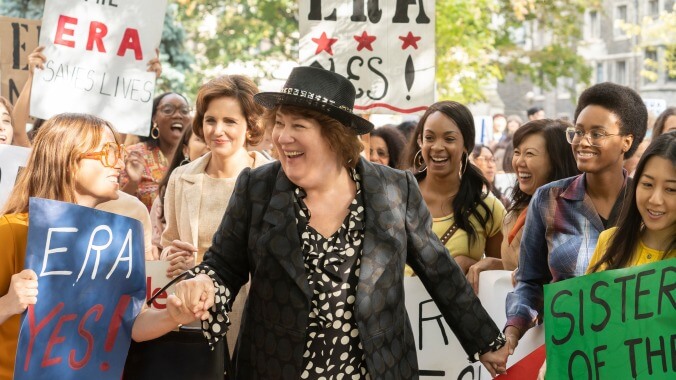In “Bella,” Mrs. America sets up the next battle


I know I’ve complained about how Mrs. America organizes its episodes by character, but “Bella” shows how good the payoff can be. Unlike a lot of the other characters with their own episodes, Bella has had a clear narrative in the series before her episode. She has clear relationships with all the characters, even the ones we—and she!—only see briefly in this episode.
She also has a storyline that’s sat in the back of Mrs. America’s mind, one of the true themes of the series: when do you fight and when do you compromise?
Gloria and Bella have already fought this out throughout the series with little moments, frustrations, and snapping back and forth. Where Bella is strategic, Gloria is idealistic; where Bella is willing to listen to “the other side,” Gloria barely wants to acknowledge them; where Bella is a lawyer who, as she says, “knows what [she] can and can’t get done,” Gloria is a writer who comes up with slogans; where Bella was a “radical” when she and Gloria met, Gloria was a dilettante.
Even little moments, like in “Phyllis & Fred & Brenda & Marc,” demonstrate their different perspectives. When Gloria gently tells Brenda she doesn’t have to do the debate and Bella gets upset Brenda’s not more excited for it—Gloria is gentle, presenting Brenda’s participation in the debate as a personal choice that can be changed. Bella calls it an obligation that Brenda has to follow through on, with enthusiasm.
At one point, I couldn’t tell whether I agreed with Gloria or Bella—I could clearly see both sides, and I wasn’t sure what I’d do in that case. I will say I skew more towards Gloria’s idealism, but I prefer Bella’s talking style. It helps that Margo Martindale is so delicious to watch, so easily does she slip into Bella’s personality. And it’s clear that both Gloria and Bella—and the show—know there isn’t really a right answer, exactly. Bella has her way and Gloria has hers, and they just have to battle it out sometimes. They do so in good faith.
As they tell the random man who tells them both to “calm down” during a barely heated discussion—seriously, who the hell was that guy?—Gloria tells him, “Oh, this is just how we talk in New York City.” “Yeah, the Upper West Side of New York City,” quips Midge Costanza (the elegantly cheekboned Annie Parisse).
Another great element of focusing on Bella is this episode is hilarious. I was feeling a bit nervous about this episode— “Jill” had been so heartbreaking—but I should’ve realized that an episode focusing on Bella would constantly cut through its own tension with shock and surprise.
The start of the episode sets the scene. When Phyllis says, “Liberals control the courts, the legislative and executive branches and the media,” about the Carter administration, I was so frustrated I wanted to throw my phone against the damn wall. So much of what she has is so hard to swallow as a modern viewer—until she gets a pie in the face from a (male!) waiter calling her a traitor to her gender. I laughed through the whole credit sequence. It’s useful humor for such a dark episode.
While Bella lost her Senate race, Assistant to the President for Public Liaison to President Carter Midge has gotten her a new gig: planning the 1977 National Women’s Conference, where several elected delegates across the country will come to Houston that November to discuss topics important to women. I knew about this conference—I once wrote about how the event was the origin of the term “woman of color”—but I was amazed to learn about the extent of it. Bella’s right that it would take years to plan such a conference, but Midge only gives her months. It’s also unpaid, which I…can’t comprehend? That’s an incredible amount of work to do pro bono?!
But Midge is right that Bella’s the perfect person to take it over. It’s so fun, seeing how the conference is constructed, from the discussion of buses to the various delegate elections to the torch relay to the letters and beautifully designed guidebooks for the conferences sent to each delegate. (Also, the fact that, according to Rosemary, the government is paying for all the delegates to come to Houston! Guess they were using that $5 million right!)
It’s a little weirder watching Phyllis and the Eagle Society break off into Rosemary (Melanie Lynskey) and the ad hoc org Citizens Review Committee, which does things like burglarize Bella’s Illinois office and steal their training handbook. The ad hoc organization is to keep the organizers of the National Women’s Conference in suspense as to what Phyllis may be planning—but also keep Phyllis out of the spotlight, where she’s become a “lightning rod,” according to Lottie. I was wondering when Rosemary was going to elbow her way into Phyllis’ spot; you don’t cast Melanie Lynskey in that kind of role for nothing. Unlike Bella and Gloria’s discussions, Phyllis doesn’t talk straight with anyone. Alice is her “ringer,” according to their daughters; Rosemary is constantly stepping on her toes; and even Lottie, whose following is similarly formidable, is merely her enemy of her enemy rather than a friend.
Can we discuss Lottie in more depth for a second? Because she gives me the absolute creeps, even more than Phyllis “Cate Blanchett doing her best crocodile smile” Schlafly! Maybe it’s how she was introduced in her Twin Peaks-esque décor, or maybe it was how she rants against NWC discussing “abortions on demand, lesbianism, and shelters for beaten wives.” Even the last one threw me back.
And of course, there’s also the fact that Phyllis is even worse when paired with Lottie. “A man is more inclined to beat his wife if he knows she’s going to get a vacation on his tax dollars,” she says in rejoinder, using a logic that I absolutely cannot wrap my head around. More inclined? Tax dollars? A vacation? A VACATION? This makes me think of a comment from last week’s recap, by someone who remembers this time in detail. Sometimes I can see the near future of a certain comment or conversation or scandal or action, and sometimes I’m just blown away by the logic people spew with such confidence. At least people then were appalled as well.
For all Phyllis’ confidence, though, she’s definitely afraid of Bella. According to Phyllis, they had the same slogan when they ran for Congress: “A woman’s place is in the house—the House of Representatives.” Except Phyllis lost twice, and Bella won.
She can’t even bear to go to the election this time, so fearful is she of losing. Bella does get a chance to meet up with Alice, Rosemary, and Pamela (Kayli Carter), and call out their hypocrisy to their faces. If only that were enough! Instead, because Phyllis was too fearful to try and win fair and square, she plays dirty—real dirty. She scrambles liberal delegates’ quotes to make them seem worse and pairs them with Bible verses. Klansmen start to get interested in the movement, and while at first Phyllis plans to disavow them, she talks euphemistically to Lottie about retaining their help as security.
It’s a conversation that comes soon after Bella’s heart-to-heart with Gloria, where she confesses that while Midge treats her as fearless, she has had moments of real terror in her life as a “radical.” While she defended Willie McGee in his 1945 case for his life, her life was also in danger. She received death threats, and had to disguise herself and stay above a brothel because “vigilantes” stalked the hotels. She was eight months pregnant, and she lost the baby due to the stress. There in lies the heart of Bella’s compromises—she knows you need to be able to back it up with an amount of bravery that is sometimes way too much to ask.
However, she does realize there’s limits to her fear—and it doesn’t mean leaving Midge and her partner Jean O’Leary (Anna Douglas) out to dry. While she dithered on including the Gay Rights resolution, she specifically adds “Sexual Preference” to the agenda. While Phyllis couldn’t even make it to her election, Jill, Brenda, Alice, Rosemary, and Pamela all won theirs, and they’re all going to be in Houston in November. Next week is the first episode not named for a character, because all the characters are going to be there.
Unfortunately, so are Phyllis’ plans. When she calls Lottie to signal she’s okay with the Klan’s help, she says definitively, “Houston will be the death knell of the women’s movement.” The camera zooms in, and she smiles. “Let’s blow it up.”
Stray observations
- When a friend of mine found out I was recapping this show, she told me she also went to Princeton with a Phyllis Schlafly—Phyllis’ granddaughter, this time—who also decided to legally change her name because she got so many comments. Uh, maybe someone would’ve figured that out the first time? She didn’t share Liza’s liberal-in-training spirit, though.
- “Every metaphor has its limits.” Seriously, Rosemary. Get it together.
- According to Lottie, “You need to understand that learning to love completely means learning to hate properly.” Uh. Sure.
- Phyllis going through menopause was not where I was expecting this show to go. Sometimes the writers make choices for Phyllis’ home life that only go half explored. What’re her feelings about menopause, other than she lashes out at Eleanor when Eleanor tries to comfort her about it?
- I guess I understand why they’d be doing the Christmas card photos so early (or maybe it’s because I was just watching the Frasier episode on that), but a grey satin blouse with a presumably wool Christmas cardigan? She’d be sweating buckets even if it wasn’t summer and she wasn’t menopausing!
- It was great seeing Betty and Bella bicker. “You don’t get credit,” Bella tells her, “because you’re difficult.” HAH.
- I liked how this episode specifically referenced past episodes, with Gloria pointing out how McGovern left them out to dry and how Phyllis riled up Gloria.
- Bella’s marriage doesn’t get much examination, probably because her husband is very okay with being a background character in her life.
- Mesmerized by Gloria’s slightly aged makeup. Just SLIGHTLY aged, mind you. Audrey’s also got a tiny streak in her hair.
- A rare misstep for the show, as far as I could tell: Gloria says they’ve “passed a resolution to decriminalize prostitution,” but I’d heard Gloria Steinem give a recent interview against that stance—to be fair, a pretty standard second wave feminism stance.